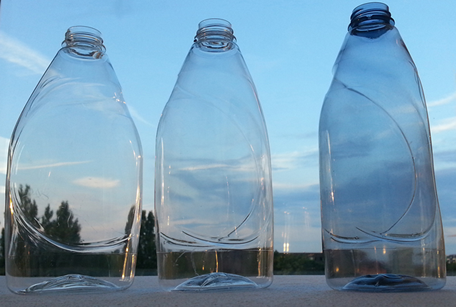Running Projects
TINOHEAT

PET flasks with 0, 10 and 250 ppm (from left to right) of new plasmonic nano-ceramic re-heater
European running Project / Grant Agreement number: 73248
Acronyme: TINOHEATActivity: SMEInst-1-09-2016
Title: Reducing the energy consumption and carbon footprint of the plastic packaging industry, using a novel environmentally friendly nanoparticle based industrial process
Summary for publication
Summary of the context and overall objectives
The general aim of the project is to reduce energy consumption and carbon fingerprint of the plastic industry. Thermoplastic polymers such as Polyethylene terephthalate (PET), Polyethylene (PE), Polypropylene (PP) being initially manufactured as a granulate, afterwards undergoing different re-shaping when being re-heated into a final article. Enormous energy is consumed at such re-heating, and very often energy costs contribute to 50% and more of the total self-cost of the final article.
These energy losses are especially big at mass manufacturing projects, such as the plastic bottle industry. First, so-called “preforms” are manufactured from PET granulates and then preforms are blown to the different final plastic bottles under heating, normally by Infrared (IR) lamps. Energy consumed at this stage determines the self-cost of the final bottle. Most of the energy lost is due to the transparency of polymers for IR irradiation. To reduce energy losses, different “re-heaters” are applied, such as graphite and mineral pigments which have higher IR adsorption than polymers. However, these re-heaters are effective only at high concentration and change the optical and mechanical properties of polymer. Polymers are no more transparent, which is a very important feature of plastic bottles. Customers mostly want to see what is inside. Having a high content of such re-heaters also makes the bottle expensive.
A Project was suggested to develop new cheap plasmonic nanoceramic particles which are effective as IR re-heaters even at extremely low concentration in ppm (particles per million) range and thus does not change the appearance of polymers and does not remarkably contribute to self-costs. To approach this goal, it was necessary to develop a new approach based on Inductively Coupled Plasma (ICP) technology. Such technology should be ecologically friendly (free of toxic and corrosive precursors and exhausts) and give a clean product free of toxic admixtures, while final application occurs with food containers/bottles.
Work performed from the beginning of the project to the end of the period covered by report.
A feasibility study was conducted and a business plan developed. The current ICP plant was improved. Different process routes were tried, and this resulted in nano-ceramics being investigated. The best embodiments, chosen by spectroscopy criteria were tested during the reheating process. Technical evaluation shows that:
- It is possible to manufacture a superior clean product by developing new technology
- Mass manufacturing of this product (plasmonic nano-ceramic re-heater) is possible
- Material and energy costs to produce 1 kg of product using existing technology were estimated and extrapolated to a more powerful ICP plant.
-The technology and nano-materials suppliers market was evaluated for possible competitors and it was found that there is no analogous technology and product on European market. Moreover, such technology is not commercially available anywhere worldwide. Existing solutions possess inherent drawbacks.
- Both technology and product are new and patentable.
- Performed trials on preform re-heating show energy savings of at least 30% at just 10 ppm of new re-heater in PET (it corresponds to 10 g of plasmonic re-heater per 1 Ton of PET). The sufficient benefit for customers was preliminary estimated.
- A potential market for new product was analyzed. It was established, that whilst there is a large potential market for the re-heater in just the plastic bottle industry alone, there is also many other sectors where this re-heater can be applied. Acceptable market sale prices were estimated.
- Based on the data accumulated, a conservative business plan was drafted. It shows an opportunity to approach good revenue already on the 4th year after the start of financing.
Progress beyond the state of the art and expected impact
Developed technology as the sum of new hardware and process parameters has unique patentable features. Such technology does not exist at industrial level, neither in Europe nor worldwide. Realization of this technology at an industrial level will push forward the technological level of Europe and remarkably improve the global competitive situation.
In contrast to known closest technical solutions, the developed technology is clean, “green” technology- it does not involve any toxic precursors and generates no toxic corrosive exhausts. Technology is applicable not only for the given plasmonic nano-ceramic re-heater but also for the manufacturing of any other refractory nano-ceramics. Establishing of industrial ICP plants will improve the ecological situation in Europe.
It needs to be stressed, that the energy savings from using the TiNO Product during PET processing are substantial. If used on a global scale and for all anticipated and not just anticipated uses, the global energy savings could accumulate to several TWh (Terra Wats Hours) or MT (Mega Tons) of CO2. Furthermore, it must be emphasized that development was done exclusively in the EU.
As the project becomes further realized, new highly qualified employment positions will be generated in Europe, not only at PlasmaChem GmbH but also in the plastic- bottle industry, as the application of this re-heater will require the manufacturing of special “masterbatches”; with a high concentration of plasmonic nano-ceramics in the PET, and this new job will be performed by other specialized European companies – who will be the suppliers of masterbatches.
Indirectly, new employment opportunities will also be generated in the European plastic industry, as the new technology will help make plastic goods cheaper, leading to more competition and turnover on the world market. That in turn means an expansion of production and more working places in Europe.

